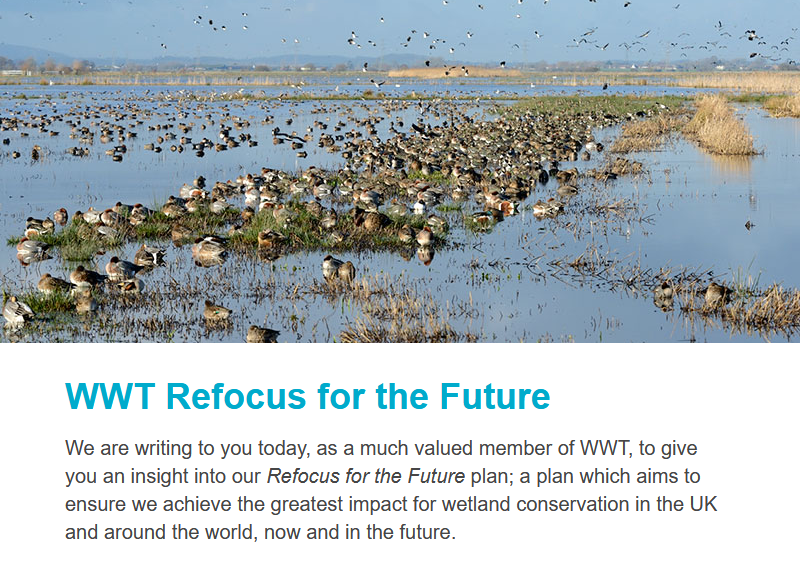
I got an email from WWT which pointed me towards this very fuzzy refocus document. There’s a lot about how great WWT is, how it is going to do loads of good things for wildlife but embedded in here is some very vague news about redundancies.
As an organisation which funds conservation through duck zoos the WWT is particularly vulnerable to anything that hits entertainment businesses such as bad weather in the holidays (Easter is a right off if it rains all the holiday), coronavirus is a big problem and then there is the added handicap of avian flu cropping up every now and again in winter.
I like WWT although, as a conservation organisation I think it punches below its weight in the UK, but if you were starting from scratch you would never invent such an organisation these days. Would you?
[registration_form]
Thought Easter was more a Rite of Spring, Mark!
Not that you’d want to write home about.
You’ve put me right off it now Alan!
Do I detect a slightly disapproving tone
To have money either to buy land or do conservation work even to campaign, it is either get creative at raising cash or just wave the begging bowl.
It may not be a first choice of funding but it is useful that it is there. Children can get up close to birds and some will be inspired by their finery, especially at Easter, and some may not like the fact that they are in a zoo but at least they will feel something and be inspired.
Close too birds look a lot finer there than through a telescope from one of those little hushed wooden temples on bird reserves.
I played in the woods when young now children are more likely to play “in” them on screen so we need some way of getting them inspired.
You need to get creative at fundraising with the facilities we have available these days. The Internet allows more information to be available which is good for campaigning and crowdfunding is possibly a more involving beginning bowl.
Rewilding is a brilliant advertising slogan. Whatever that means.
Finally a zoo acts as a diversionary entertainment for the excess population who roam round reserves as Jane Adams blogged at the weekend.
I must admit to not having been there for years, since the day of the Ne ne work.
You may not like zoos but think of something. Rather than just admonishing people to “love nature” and banning feeding ducks on the local pond. Toddlers always seem to be enthralled by that.
“I played in the woods when young now children are more likely to play “in” them on screen so we need some way of getting them inspired.”
I know a 6/7 year old who is currently studying parastic worms in mollusc eggs with a microscope.
Yes, my reaction exactly – it was one of those policy statements that looks good but tells you nothing – in particular, what (and who) is being cut. I assume it was actually an announcement that WWT is making some staff redundant, maybe an attempt at a pre-emptive bit of PR. And I was very interested to see it over the name of a ‘chief operations officer’ – I’m always rather suspicious of that title. Why not the head or the chair of the organisation ?
And the difference between the WWT and the RSPB is what?
Both operate theme parks; both are reliant on public funding, with the RSPB totally dependent, both try and prise from the general public as much wonga as possible, the WWT being a lot more savvy than the RSPB.
The WWT still have an important interest in a global conservation project. The spoon-billed sandpiper, the only known bird to hatch with a spatulate bill.
I must visit one of these “theme parks” you claim the RSPB operate, can you tell me where they are?
I have only ever visited nature reserves, which whilst admittedly are managed landscapes providing homes for a variety of species are at least run on the basis of scientific evidence, provide oasis’s in a largely sterile landscape and have far greater biodiversity than the land managed for shooting.